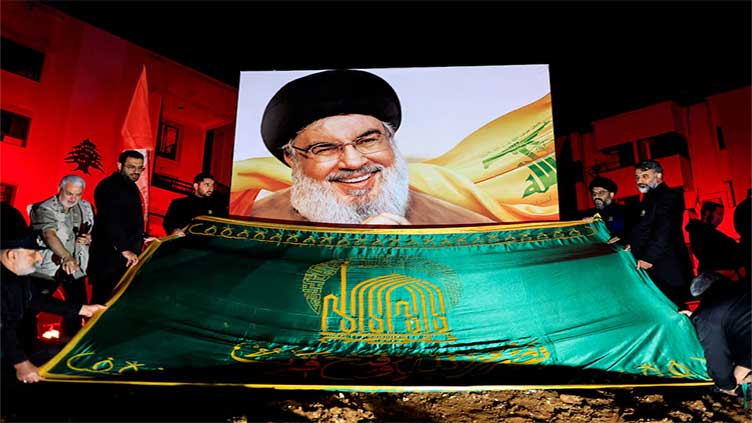Lebanon's Hezbollah to bury Nasrallah in mass funeral

World
Nasrallah was killed on September 27 in an Israeli airstrike in Beirut
BEIRUT (Reuters) – Lebanon's Hezbollah will bury its former leader Hassan Nasrallah on Sunday nearly five months after he was killed in an Israeli airstrike, in a mass funeral aimed at showing political strength after the group emerged badly weakened from last year's war.
Nasrallah was killed on September 27 in an Israeli airstrike as he met commanders in a bunker in Beirut's southern suburbs, a stunning blow in the early phase of an Israeli offensive that has left the Iran-backed group a shadow of its former self.
Revered by Hezbollah supporters, Nasrallah led the Shi'ite Muslim group through decades of conflict with Israel, overseeing its transformation into a military force with regional sway and becoming one of the most prominent Arab figures in generations.
The funeral in Beirut's southern suburbs will also honour Hashem Safieddine, who led Hezbollah for one week after Nasrallah's death before he was also killed by Israel, underlining how deeply Israeli intelligence had penetrated the paramilitary group. He will be buried in the south on Monday.
"The funeral is a launchpad for the next phase. A great funeral that draws hundreds of thousands is a way of telling everyone that Hezbollah still exists, that it is still the main Shi'ite actor in Lebanon," said Mohanad Hage Ali of the Carnegie Middle East Center.
Israel killed thousands of Hezbollah fighters and inflicted huge destruction in Beirut's southern suburbs and other areas of Lebanon where its supporters live. The impact on Hezbollah was compounded by the ousting of its ally Bashar al-Assad in Syria, severing the supply route to Iran.
Its weakened stature has been reflected in Lebanon's post-war politics, with the group unable to impose its will in the formation of a new government and language legitimising its arsenal omitted from the new cabinet's policy statement.
Sheikh Sadeq al-Nabulsi, a cleric close to Hezbollah, said adversaries in Lebanon and abroad believed the group had been defeated, but the funeral would be a message that this was not the case. It would be a "battle to prove Hezbollah's existence".
The ceremony will be held at Lebanon's biggest sports arena - Camille Chamoun Sports City Stadium on the outskirts of the Hezbollah-controlled southern suburbs.
Nasrallah will then be buried at a dedicated site nearby.
Iranian Foreign Minister Abbas Araqchi will attend, an Iranian official said. Several leaders of Iraqi Shi'ite militias are also expected to attend.
Iraqi Airways has added flights to Beirut to cope with extra demand from Iraqis who want to travel to Beirut for the funeral, a spokesperson for the Iraqi transportation ministry said.
Nasrallah's death was a huge blow to Iran, whose Revolutionary Guards established Hezbollah in 1982.
Supporters remember him for standing up to Israel and defying the United States. To his foes, he was head of a terrorist organisation and a proxy for Iran's Shi'ite Islamist theocracy in its tussle for influence in the Middle East.
After he was killed, Nasrallah was buried temporarily next to his son, Hadi, who died fighting for Hezbollah in 1997.
His official funeral was scheduled to allow time for the withdrawal of Israeli forces from south Lebanon under the terms of a US-backed ceasefire which ended last year's war.
Though Israel has largely withdrawn from the south, its troops continue to hold five hilltop positions in the area, which Hezbollah battled for years to liberate from Israeli forces before they withdrew in 2000.
The conflict spiralled after Hezbollah opened fire in support of its Palestinian ally Hamas at the start of the Gaza war, on October 8, 2023.


